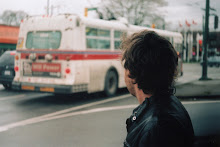Ok, this is a bit after-the-fact, but I am going to try and review Gabor Maté's book, The Realm of Hungry Ghosts.
The book came out a few months back (I got it for Christmas) and has been receiving many rave reviews from the lefty press, including rabble.ca, thetyee.ca and the Walrus, though some may debate whether the Walrus is lefty. The general consensus is that Maté writes with knowledge and compassion about addiction and the War on Drugs. His is the power to sway audiences from judgmental attitudes towards junkies and maneuver them toward pity and love. But not hope. Oh no, Gabor believes in no rosy future for his patients. Rather, they must suffer their lot but at least a gentle and rich doctor can ease their pain in the meantime.
To sum up, Gabor Maté works in the inner city of Vancouver - the Downtown Eastside - with people who cope with all sorts of problems from addictions to mental illness to violence. Instead of condemning them for what they've managed to get themselves into, namely poverty, Maté thinks we should consider their childhood of trauma in our analysis of their current lifestyle. Addiction, he says, is the bodies way of dealing with trauma and abuse. I'm oversimplifying; he goes into a lengthy section on brain chemistry and addiction as well. The reason I skip over this part, though, is because I find it largely irrelevant. If anybody actually needs to be convinced of the reasons for addiction, well, then maybe they'd find this section useful. However, I was looking for solutions, not descriptions.
The book is intended at a lay audience - one that does not console the down-and-out on a daily basis like Gabor and myself. But unlike me, Gabor's answer lies in medication. Yes, we both love our patients, and I do not use that word lightly. And we both see a bit of ourselves in them, share our lives with them, and miss them when we're at home.
But Gabor's love comes in the form of a pill, tested and sold by Big Pharma. Moreover, he sees the pill as an end, not a means. People are destined to die down here, he says in an interview with the Pivot Legal Society. "I see myself as working in palliative care." And he's serious. Just like the Empire of Poverty Pimping he works for, the Portland Hotel Society, Gabor offers brief respite from pain but little else. He cannot fathom that people have the ability - with help and compassion - to get out of the Downtown Eastside. His is a top-down model: doctors, social workers, then clients. Clients couldn't possibly write books about their own lives, so Maté has to, and reap the rewards.
By contrast, I firmly believe that people in the deepest Hell of addiction and poverty can get out of it, with our commitment to social justice, fair economics, entrepreneurship, and less reliance on pills and famous authors to ease their suffering. Take the model of the Hope in Shadows calendar, put out by Pivot Legal Society: instead of just profiting off pictures of poor people, instead of just giving poor people some cash in exchange for their photos, Pivot teaches people about making money, about building community, about being proud of accomplishments and about being role models. Maté is maybe still to fresh on the scene to appreciate people's potential, but I hope he figures it out soon.
Subscribe to:
Post Comments (Atom)

2 comments:
A clinical psychology student I know also gave the book a mixed assessment. She saw therapy, not medication, as a big part of the solution. There's therapy, and there's therapy, but done right, it's more like a coach/helper situation, rather than a doctor. I'd like to learn more about Bruce Alexander's view on addiction- I doubt it's top-down and medication-centered.
Cayce/Clavio,
You are part of the solution.
Joe
Post a Comment